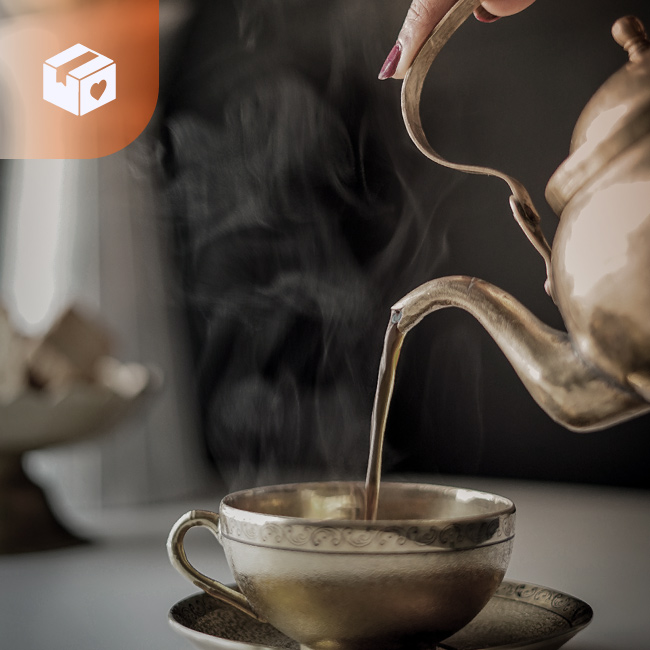
Tea Trunk’s D2C Shows 8X Growth in 2020, Here’s How!
About this Podcast:
India’s retail landscape is currently witnessing a sea of change. Online shopping has now become a necessity rather than a convenience and with the adoption wave and growing sales, D2C brands have become consumer favourites in the last year. With digital stakes continually rising, D2C brands are bringing a new dimension to retail. In this episode of The Retail Podcast by Vue.ai, we’re in conversation with Snigdha Manchanda, founder & CEO of Tea Trunk – a premium D2C tea brand that’s crafting wellness teas for the new generation of health-conscious consumers.
Episode Transcript:
Akshara Subramanian
Welcome to a new episode of The Retail Podcast by Vue.ai. In these episodes, we speak to global change makers in retail that are moving the needle, pushing for change and creating impact. We've seen a sea of change is lashing India's retail landscape, shopping online has now become a necessity rather than a convenience. And thanks to the adoption wave and growing sales, D2C brands have become consumer favorites in the last year. With digital stakes continually rising D2C brands are bringing a new dimension in retail. Tea Trunk is a wellness D2C online store that curates the finest Indian tea leaves and crafts them into unique blends for the health conscious consumers. The brand has been part of the D2C game since 2013, and their omnichannel selling practices, their growth and their success story is sure to inspire all of you that are listening right now. Today, we're in conversation with Snigdha Manchanda, CEO of Tea Trunk, talking to us about how Indian retail brands are leveraging the D2C model like never before. Thanks Snigdha, for joining us today.
Snigdha Manchanda
Thank you Akshara, for having me.
Akshara Subramanian
Great, so Snigdha, let's start off by talking about the growth and evolution of the D2C business model in the Indian market, the past few years have witnessed a surge in D2C brands on a global level, and the same trend has now trickled down to the Indian markets as well. And in fact, research shows that India's D2C market is going to be worth $100 billion in 5 years. So tell us what prompted and led you into the D2C wellness landscape and how have things changed over the past couple of years?Snigdha Manchanda
Tea Trunk is an artisanal tea brand sourcing these teas directly from farmers and farmer cooperatives within India and then crafting them into unique blends. When I started Tea Trunk back in 2013, I literally set up our first Shopify store overnight with just 6 SKUs and just 6 different teas to start off with. And today we have about 25 different unique teas from India and Japan. And we've just, in the year 2020, seen an 8x growth on our eCommerce platform for the last few years have been very exciting in the eCommerce D2C space. And specifically when we started out, we were operating in a space where tea has been viewed as a commodity for decades, like tea has been on legacy trading business for almost a century now. And the only way it could be traded was either through auction houses or direct into distributors and brokers. But eCommerce opened up a whole new opportunity for tea not just to you know, capture the interests of tea lovers in India, but even worldwide. So at Tea Trunk, I was very clear that we will be shipping worldwide from Day-0 and making these amazing teas from India accessible to tea lovers worldwide. So when I talk about building a brand and building a community, we can only make this happen by owning our customer data. And which is why Tea Trunk has been very focused on growing our customer base on our own websites. So today, almost 70% of our eCommerce revenue comes from our own website versus marketplaces. So most D2C brands early on maybe start off with Amazon, and that's a great start to you know, get proof of concept. But eventually, if you're building a D2C brand for the long haul, it's really important to understand what should be the right mix between your eCommerce revenue on your own website versus marketplaces.Akshara Subramanian
That sounds like quite a journey. I'm curious, when you started off was tea growing a popular concept, or did you have to build interest around wellness teas from scratch?Snigdha Manchanda
So green tea has been trending only in the last 5 years or so, right? I mean, the concept of chai is very different from green tea. And I think, I often joke about this, like my biggest competitor is not coffee, it's actually masala chai. You know, so we're competing in a market where we're shifting the perception of what tea could be, you know, we're still educating people about that. You don't add milk to your Earl Grey and you don't add milk to a Darjeeling tea. Even if it's black tea, Darjeeling black tea cannot be had with milk. You know, there are basic nuances in tea consumption and tea drinking habits that we are spending a lot of our time and resources on educating our customer. And if you look at the challenge for us as a brand is to change a pre-existing habit for our customers. While I'm not trying to introduce a new product like, let's say a granola bar is a very new habit to include in your daily lifestyle. In that sense, my product is easy in terms of infusing it in your day-to-day lifestyle. But at the same time, it's very challenging because we are trying to change that drinking habit. We are trying to get you to maybe drink masala chai in the morning, but then have some green tea at your 4 o'clock tea time. That is a very marked shift, which requires a lot of investment in building the awareness and building the advocacy around the health benefits of drinking green tea. And I think at Tea Trunk we've been able to do a wonderful job over the last few years. In fact, you know, when COVID hit and there was a flurry of turmeric teas in the market, Tea Trunk had launched its turmeric tea back in 2018. So we already had an existing product, not just that, we already had an existing customer base of consumers who already enjoy turmeric green tea, you know, so being ahead of the curve in the health and wellness phase and and also preempting some of these health trends has really helped Tea Trunk as a brand.Akshara Subramanian
Right. It's interesting that you said that you have an existing customer base for turmeric green tea, and it kind of brings me to my next question. Who is your typical customer base? Because I know we're obviously seeing wellness become a more accepted phenomenon and something that people are definitely aspiring towards a lot more. So what are their palates like and what are they finding different about your products when compared to other competitors in the wellness space?Snigdha Manchanda
When I started Tea Trunk back in 2013, I bootstrapped the business for the first 2 years, so essentially I was growing my customer base with 0 marketing budgets and we grew 200% year-on-year organically. So the customer base that we have today is the core of our tea community. Our tea tribe has grown very organically, and today almost 80% of our customer base are women. And this is also because tea being part of the health and wellness routine and women are also key decision makers for the family when they are choosing a health and wellness product. At the same time, the positioning for our brand, which is not in the commodity, these days. I mean, we're not a tea that you can pick up at a supermarket. And I think that's important. Like you know if I ask you, Akshara, to go down and bring me a box of tea for making chai, you would just pick up any box from the supermarket and wouldn't think twice about it. But if I ask you that Akshara, please suggest a tea which will help me sleep better at night and help me, you know, relieve anxiety and help me unwind in the evenings, you would probably be doing a bit of research before you pick a product. And I think that's where Tea Trunk comes into picture, the kind of, you know, the brand that we build around educating our customers. I'm talking about Chamomile being a natural cure for insomnia and why it's a caffeine-free tea which is perfect before bedtime, has made our customers choose our product more as a functional beverage, which they're drinking to address a particular need or addressing certain preventive health care needs. You know, today self care is, I think, a highly used and abused word, but self care is something that people were forced to think about during 2020. I was just looking at a report where almost 72% of Indians said that they are investing in products and services which help them with mindfulness, which they're investing, whether it's an app that they subscribe to or a certain health supplement or herbal tea that they started drinking as an investment in their mindfulness. So I think that consciousness has come into our customer base. So today a Tea Trunk customer is a conscious consumer who's looking for a specific tea for complimenting their lifestyle. For teas to drink before gym, like matcha is a pre-workout drink in their smoothie and then having rose oolong as a digestive tea post meals and then ending the day with the lavender or camomile brew. So, I think the way you're designing your lifestyle and understanding where teas can become a part of your daily wellness routine and think that's the Tea Trunk customer.Akshara Subramanian
That's actually very well put, and you've definitely made me think of how as a consumer, I create space for wellness in my own life. And in fact, the things that you said about the benefits of each of the teas and how it can be a deeper part of our life takes me to the next question that I wanted to ask you. You had once I think in an interview with The Hindu, you had once said not having a tea school in India would be like not having a wine school in France. And I found that quite interesting. Do you think that's the gap that needs to be filled? Education around tea or why people need to learn more about tea for them to make it a real habit in their lives? How are you doing this as a brand?Snigdha Manchanda
I think first, the platforms that we have enable us to do so, right? If I was a typical B2B trading brand, I would probably have to hire hundreds of promoters across the country standing and talking about the product. But I have an alternate option to create content, to create video, to have an eCommerce website which talks about creating the right context in which my product can be experienced, right? And I feel that this is something we learned very early on in Tea Trunk. Like we've never been in B2B and modern retail, it is pretty much is a conscious choice because I wanted to talk about why drink white tea, but being on a supermarket shelf did not allow me the context in which I can sell my product, right? I think eCommerce has a big role to play on how Tea Trunk has been able to create that container in which we can talk about our teas. And how we've been able to do is not just, you know, if you look at the engagement of Tea Trunk on a social channels, on our website, even the kind of views that we receive, we're working with a very highly engaged group of tea tribe, not just within India, I'm talking worldwide. And, you know, I mean, I'm just going to share an anecdote. During the pandemic, of course, there were several delays with logistics and shipping. So we had a customer write down on a post on our Instagram wall saying that Tea Trunk is not shipping on time, it's a fraud and just very like defamatory comments. And before my customer service team could respond to that comment, we already had 3 other people from our tea community respond to that, saying that, you know, Tea Trunk is one of the most loved tea brands in India and all brands are facing challenges, you should wait or you know, I have never faced any challenge with Tea Trunk customer service so I think it was really overwhelming for me to see how we created these unofficial brand ambassadors. And again, this is something we would not have been able to do if the brand didn't grow organically, if the brand didn't grow in the context of, you know, spreading awareness. We were very focused on giving back to our community with the kind of tea workshops, tea experiences. Just in 2020 alone, over 2000 people would have attended our tea tasting workshops and experiences, not just in India, but worldwide. Throughout the lock-down, apart from all the free and complementary programs that we were running on our social channels, I also hosted several tea masterclasses. We hosted a class on how to make your own tea blend at home using some tea sommelier basics. I think it's very important for me that my brand is not just launching the next lemon green tea. It's been done to death. And my personal focus has always been to create unique tea experiences with our brand and how do we create that with the product? During Diwali, in November, we realized that, you know, people are probably going to be having more house parties and celebrating at home. So we created a Botanicals Cocktail Kit, which is a home mixology kit, so you can actually make cocktails using Tea Trunk teas and botanicals. And that, of course, was the hands down our best seller on our website. I think when, I see we're looking at what is, how will our teas blend into your lifestyle, we're going beyond seeing that this is a hot cup of tea. We're also thinking how you could use this in a cocktail, we launched a matcha smoothie bowl thinking of how you can make this part of your morning breakfast routine. You know, so it's exploring and going outside the bubble to think how we can innovate with tea as a complement to your lifestyle.Akshara Subramanian
I love that. It's a great way to bring tea to your consumers conceptually, right? And I love the idea of mixologists using deeply and festive cocktails or matcha, like you said, it's a great incentive. And I think this is really what sticks, right, with a community, giving them as many ideas as possible on how to use the product. You're essentially giving them all the means to build these tea driven habits into their lives, organically. And I think that's really cool. You also mentioned that there was some complaints around delivery during the pandemic and stuff. But I remember in our earlier conversations you talked about how you were delivering at a time when even Amazon wasn't, so that must have been a real light at the end of the tunnel. How did that work?Snigdha Manchanda
So Tea Trunk is based out of Goa and we've been based out of Goa for the last 7 years, so I think this was the year when the decision paid off being in Goa because Goa was a green zone throughout the pandemic. So apart from one week in March, the last week of March, we were open throughout and we working with a very limited team at our warehouse and we were working in 2 shifts so that generally we maintain all the social distancing and the rules. But we were able to rally the troops fairly quickly, you know, so our delivery partner was operational and we were able to move product right from April onwards at a time that even Amazon was not accepting orders. It was at that point in time our average customer, our average orders had gone up by 10x. We were seeing people of course stocking up at that point. And so we, you know, people ordering 10 boxes of chamomile tea at one point together in April. So I think also being the stage that we are at Tea Trunk, we're a small, lean team. We're fairly agile as compared to, let's say, the brands that are working at large scales so I think we were able to move quickly, also we were able to innovate with the inventory we had in hand. There was a challenge securing more inventory. You know, while we were able to ship product, we really needed more product. But at the same time, tea plantations were shut down. By the time they opened, there was a delay there. So we looked at, OK, what do we have in stock? So, you know, this is an inside story, but I'm happy to share it here that one point in time, we got an out of tea so we just had our rose petals and some of the botanicals that we use to blend in the teas. You know, what do we do now? We just have these, so we quickly created new packaging and a product line called Botanicals and then we started selling just pure rose petals, pure tulsi, and pure spearmint under a new collection. And that worked out beautifully for us because people were also looking for caffeine-free teas at that point in time, right? Because when you're at home, you’re having multiple cups of tea, you don't want to, like, ramp up on your caffeine content. So I think just this Indian jugaad of working with what we have worked out beautifully for us during the lockdown.Akshara Subramanian
Amazing. You've actually talked about quite a few challenges, you know, like running out of product, for example, or immediate fulfillment, but tell us some of the other challenges that you faced in building a D2C brand because it is a hard task. And you were also talking about how tea as a category has only been accepted by a larger audience in the last 5 years. And you're one of the very few brands that had a solid focus only on tea, so how are you tackling these challenges that come up?Snigdha Manchanda
I think practicing just on where your brand should be, should not be, what you should sell, should not sell, have been very crucial decisions in the life of the business. When we talk about building a brand, it's not just my website, it's not just my packaging. It is a series of decisions that I have made over a period of time to create the environment in which my brand survives, right? So what is that decision of where I'm going to be? What is going to be on my packaging? Am I going to sell 200 teas on my website, or will I restrain myself and select and curate the 20 best teas? Those have been very crucial decisions in the life of the business. And if you look at Tea Trunk as compared to our peers who have over 200 teas on their website, I think it's very confusing, to a customer or even for me as a layperson to choose between 200 and just get a guided experience. And the value add I can bring as a tea expert and tea sommelier is to say that this is my Rose Oolong and this is the best Rose Oolong that is out there. I tested 100 teas before I picked this and I said no to 99 others so this is the 1. I don't want to offer five other rose variants to you, to make your life difficult. This is the best one. And I think the brand promise has been centered around quality, credibility of my expertise as an in-house tea sommelier and I think all of these have led to, you know, creating and building the character for our brand, which is it today.Akshara Subramanian
Absolutely, I think it's super important to have quality as a benchmark right, and more importantly, I think we're living in the era of quantity and not quality. There's just too much choice and too many things to keep track of. And, you know, sometimes when I'm thinking a gourmet product or even a regular one for that matter, I want my choices to be easy and useful and not be in a place where I feel confused and overwhelmed every single time as a shopper. So I really hear you there. I'd actually like to move on to the topic of online experiences, you know. And what are some of the interesting things that you are offering that make the experience of tea buying a lot more exciting?Snigdha Manchanda
So my expertise is in tea blending, and that is what is most exciting to me. And I realize a lot of people who may not be tea experts or just tea enthusiasts enjoy co-creating a product with you, right? When you're at an ice cream store, you can just get a mango dolly or you can make your own sundae. Of course, the second one is more exciting where you get to build your own sundae. And that's something you can do on the Tea Trunk website. Right now, you can head over and make your own tea blend. So this is something that we devised specifically as a custom offering on our website, which is India's first such offering of a "Make Your Own Tea Blend". And I realized that a lot of people who may like certain flavors or have certain preferences, enjoy the process of crafting their own blend. And it's just 100 grams, which is specially crafted in that small batch exclusively for you. So there's an element of personalization, customization, which is, of course, enabled with the technology that we were able to use on the website. But I think that's been one of the key innovations that has helped us offer a customized product on the website.Akshara Subramanian
Is there any interesting anecdote from that or any feedback that you've gotten about the custom teas that you've created?Snigdha Manchanda
So with every custom tea, you get taste notes from the tea sommelier. So that's the next level of customization where we're sending you how to brew this tea. We're not just making this tea, we are also showing you how to do this correctly and sharing notes from there. I think so often I get a personal DM around, "You know, I mixed this and this", "is this a good combination" or seeking advice. And I love having these conversations. I think it's always fun to see what people come and mix with their blends. Also, I just want to add that it's such a special gift, I would say 8 out of 10 customers who choose Make Your Own Tea Blend is to gift it to someone because they can either pick up a box of tea from Amazon or one of those supermarkets, or they can create a custom blend as a gift. I think that's where we've seen the most, I think my team, my customer service team writes the most fun love notes, and we have a collection of them to share because people are often gifting these Make Your Own Tea Blends as a personalized gift for someone special.Akshara Subramanian
Oh my God, just the thought of that sounds very relaxing, and I feel like that made me curious to find out what is your personal association with tea, because as a tea sommelier you probably have so much experience and knowledge. And of course, I know the story of the business and its growth, but I also want to ask why the focus on tea?Snigdha Manchanda
So I grew up collecting tea and you know I'm talking about, in the 90s, like friends and family whoever would travel, well, I would ask them to bring back tea as a souvenir for me and like just unknowingly I would just see this as my tea treasure in my dad's old trunk. And I worked in Bombay for about a decade in corporate communications and as a content strategist. And on a sabbatical from work, I decided to study tea professionally and that's when I went to Sri Lanka and trained under a Japanese tea master. So the kind of journey that I had with tea was very unintentional. So I went on to do a specialization on blending at the Speciality Tea Institute in New York. And when I returned, I decided to name my company Tea Trunk as a tribute to where my love of tea began.Akshara Subramanian
Wow, that's amazing. And I feel like I now understand what you meant by tea school because it clearly requires this in-depth knowledge on brewing and blending and understanding flavors. It's all very exciting. Anyway, I think this brings us to the end of the podcast, so thank you so much Snigdha, for being part of this episode. We learned so much about Tea Trunk and we're very excited to see it grow in the coming years.Snigdha Manchanda
Thanks for having me, Akshara.Akshara Subramanian
For more podcasts around how brands have scaled successfully during the pandemic, subscribe to The Retail Podcast by Vue.ai.Meet your speakers:

Snigdha Manchanda
Founder & CEO, Tea Trunk

Akshara Subramanian
Director, Customer Marketing, Vue.ai





